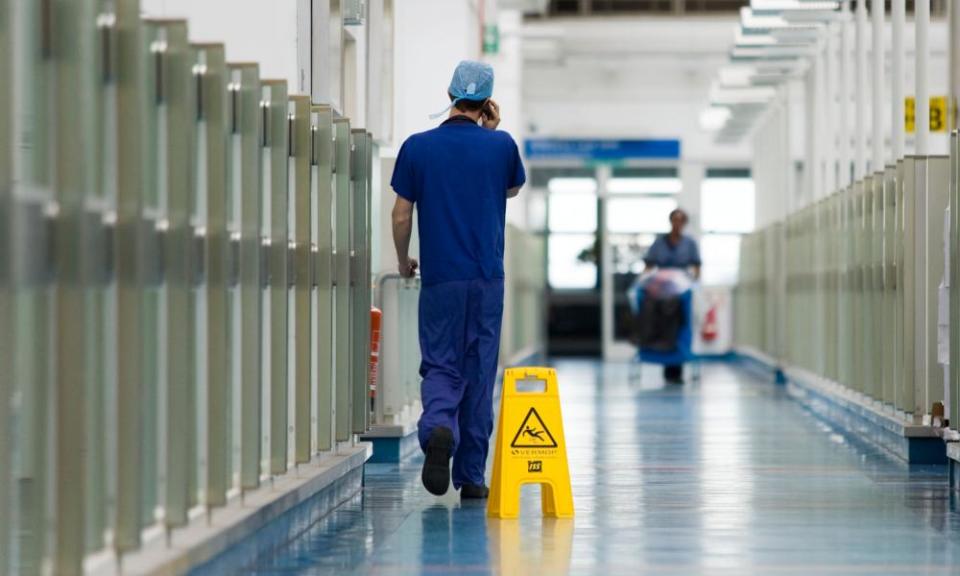'Psychological PPE' is what Britain's health professionals urgently need now

We are now entering the second wave of this pandemic. After a brief summer lull, there is an overwhelming sense of deja vu. Despite washing our hands to the tune of Peppa Pig, maintaining social distancing, local and national lockdowns, isolating ourselves from our friends and family, and wearing face masks, we appear to be back where we started, with exponentially rising numbers of infections.
Related: 'I had to be sectioned': the NHS staff broken and burned out by Covid
Hospitals, general practices and community services are gearing up to deal with the inevitable rise in patients with Covid-19, while trying to keep other services functioning as near to normal as possible. This time around we are better prepared. We understand which interventions work (and which do not); we have a greater understanding of the disease and how it affects different patient populations; and we even have the prospect of a vaccine in sight.
However, we are also increasingly aware of the collateral damage this virus creates to all of us due to lockdown, isolation, job losses and the economic impact of the measures implemented to protect us. These raise the risk of developing psychiatric disorders, especially depression, anxiety and post-traumatic stress disorder (PTSD) – all of which are associated with increased suicide risk. Mental health problems will be experienced by the general population, but evidence from healthcare professionals working during the 2002-04 Sars and 2014 Ebola outbreaks found they were particularly at risk, suffering higher levels of stress, insomnia, anxiety and depression.
For the last decade I have led NHS Practitioner Health, a confidential service for doctors, dentists and, now, clinical medical students with mental illness. It was established in response to high rates of burnout, mental illness and suicide among medical professionals, as well as in an attempt to address the barriers they face to receiving care. Doctors are trained to make the patient their first concern. So showing any signs of mental illness themselves, or indeed having any illness, is seen personally and professionally as letting the side down. Pre-pandemic, around 60 new patients attended the service every week. Now it is double that.
Most have depression, anxiety and symptoms indistinguishable from PTSD. The causes of the distress are not hard to find. Overwhelming workload, inadequate personal protection equipment and feeling unsupported all contribute.
The levels of trauma, grief, helplessness and hopelessness are high. One doctor cried as she told me that more of her patients had died in one month than during the whole of her career. Unable even to hold the hands of her dying patients, she felt devastated and was reminded of the difference between the death of her own grandmother (when all the family were assembled by the bedside) and those dying on her ward, alone. What this doctor is experiencing is moral distress, or “moral injury”. While not a mental illness per se, moral injury is perhaps the most prevalent psychological effect of Covid-19. It’s a military term relating to the harm done to a person’s moral compass when they witness and fail to prevent an act that transgresses their ethical codes of conduct.
Making life-and-death decisions is commonplace for clinicians. However, Covid-19 risks putting them in the impossible position of having, for example, to choose which of two equally sick patients is provided with specific care, owing to limited resources; or having to juggle their own safety against lack of adequate PPE. However, by far the biggest problem I have seen among doctors is exhaustion. Doctors have an exaggerated sense of personal responsibility – when their patients are threatened, especially by a fast-spreading and frightening viral illness, they want to do everything within their power to help. This inevitably means working harder, putting in extra shifts or staying at work longer.
Fatigue is felt sometimes more so by those working behind the scenes, staring at computer screens, working in call centres or advice lines or developing policies to guide our clinical practice.
In May, I became the chair of a new charity, Doctors in Distress, with the twin aims of reducing stigma and the rate of suicide among doctors, which is double (or even higher) than the general population.
Safeguarding all health workers’ mental health is both morally imperative and also vital for sustaining a workable and effective healthcare system at this critical time. Providing healthcare staff with “psychological PPE” is as important as physical masks and gowns. During the first wave, many hospitals had put in place respite or decompression rooms; improved access to on-site psychological support; provided necessary sustenance (day and night) for hungry staff and set time aside for important debriefing at the end of busy shifts.
These must all now be reinstated. Especially important are confidential spaces where healthcare staff can talk about the emotional impact of their work, and groups where they are able to share their experiences and gain and provide support to each other. On an individual level, health professionals can take steps to look after themselves. There are no easy solutions but taking time out, ensuring adequate sleep and limiting use of social media can help, as does seeking professional help if negative thoughts, feelings of hopelessness, self-blame become too much.
Gone is the thrill of the unknown and the adrenaline that drove health professionals to work even harder than ever. Many are now running on empty – depleted, demoralised and depressed. Now, more than ever is the time to focus on bringing about long-lasting changes to reduce the burden of mental illness in those who care for us.
• Dr Clare Gerada is chair of Doctors in Distress and Medical Director of NHS Practitioner Health. Her new book Beneath the White Coat: Doctors, their minds and mental health is published by Routledge, £22.99. All proceeds will be donated to Doctors in Distress

 Yahoo Finance
Yahoo Finance 